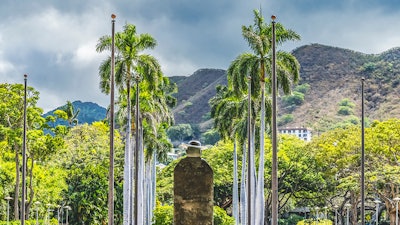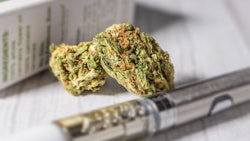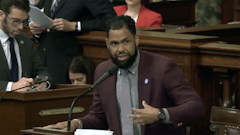
The first state to legalize medical cannabis via legislature 23 years ago, Hawaii lawmakers are now taking on adult-use reform: Senate Bill 669 drew 22-3 approval March 7 in the upper chamber.
The legislation, which aims to allow adults 21 years and older to purchase and possess up to 30 grams of cannabis and grow up to six plants at home, as well as establish regulations and taxation for a commercial market, now heads to the House, where further discussion could be delayed until this summer.
While California, Oregon, Alaska, Washington and Maine legalized medical cannabis through ballot measures before the turn of the century, Hawaii became the first state to approve a medical cannabis bill in 2000. When former Gov. Benjamin Cayetano signed the legislation in June of that year, he said the bill was one aspect of his effort to make Hawaii the health center of the Pacific, The Associated Press reported.
Now, nearly a quarter century later, Hawaii represents the oldest medical cannabis market in the nation that has yet to expand to adult-use legalization. But under recently inaugurated Democratic Gov. Joshua Green, who expressed support for full legalization along his 2022 campaign trail, Hawaii could be the 22nd state to adopt adult-use reform.
During a gubernatorial debate in October, Green said he would support regulating cannabis like tobacco and investing tax revenue in the mental health care system.
Potential tax revenue generated from legalizing adult-use cannabis was one topic of debate during Tuesday’s session on the Senate floor. S.B. 669 would create a 10% tax on cannabis sales—which is in addition to any other state or local taxes imposed upon businesses—with tax revenue generated from the 10% rate to be paid into the State Treasury, according to the bill.
Democratic Sen. Sharon Moriwaki, one of three senators who voted against the bill, called adult-use legalization “premature” in Hawaii, claiming that S.B. 669 omits regulatory safeguards for the health and safety of communities in the state.
“We know the widespread adverse impacts of substance abuse,” she said. “We struggle to help our homeless, domestically abused, because of addiction. This session we’re making more stringent our drunk driving laws and controlling vaping. How does decriminalizing cannabis for personal use fit in with these values? We must ask ourselves, if we are enabling the abuse, should this bill pass? It makes little sense to use increased tax revenues to justify more drug use.”
Democratic Sen. Angus McKelvey, one of four sponsors for the 56-page legislation, said cannabis revenues are currently being generated throughout Hawaii, but he elaborated that those revenues are funding organized crime rather than community programs.
With more than 5,000 crimes per 100,000 people, Hawaii has the 13th highest crime rate in the U.S., according to FBI crime data.
“You have purple and red states … who have gone in this direction—to bring it above ground and to tax the revenue,” McKelvey said on the floor. “Right now, the revenue that’s generated, and it’s happening everywhere, goes to organized crime. It goes to off-world figures. It doesn’t go to fund our schools. It doesn’t go to fund our communities. It doesn’t even go to fund addiction programs. It goes into the hands of criminals.”
McKelvey continued and said only through regulation and taxation can Hawaii make cannabis “work for our communities” instead of against them.
Under S.B. 669, an independent Hawaii Cannabis Regulatory Authority would be established to license and oversee a regulated market, including the state’s current medical program, according to the bill. The agency would have an executive director appointed by the governor.
That regulatory body would have the power to determine and establish the process and methodology by which licenses would be awarded. In addition, the agency would be charged with reviewing data and market conditions to determine the maximum number of licenses that may be issued in order to meet estimated production demand, according to the bill. Application fees would not exceed $10,000 from the onset, but those fees could be adjusted annually.
Addressing what McKelvey called concerns of monopolization, S.B. 669 would allow a person to have interest in more than one license, but the legislation would prohibit a person from having interest in more than one license in each category, from cultivation to retail and laboratory testing.
The legislation also establishes a “pilot period,” allowing existing medical operators to sell cannabis to both patients and adult-use consumers for a period of two years or until the final issuance of adult-use rules—whatever comes first.
“For years, advocates have been working to pass legislation to sensibly legalize cannabis in Hawaii,” DeVaughn Ward, senior legislative counsel at the Marijuana Policy Project and Hawaii resident, said in a public statement. “Now that this bill has advanced out of the Senate, Hawaii is one step closer to becoming the next state to end cannabis prohibition.”
While S.B. 669 garnered widespread support in the Senate, the adult-use legislation could hit a roadblock in the lower chamber, where House Speaker Scott Saiki is planning to wait until this summer to advance discussions, he told Honolulu Star-Advertiser on March 1.
“There were a number of bills that were introduced in the House to legalize recreational marijuana,” Saiki said on the news outlet’s Spotlight Hawaii livestream show. “What I’ve informed the chairs of those committees is that we should wait and take a look at this over the summer and come back with a bill that’s comprehensive and addresses the concerns that are always raised about marijuana use in Hawaii, including the federal restrictions and the law enforcement concerns.”
While Saiki’s comments to kick the can down the road may draw concerns from legalization advocates, the current House speaker did sponsor an adult-use legalization bill, House Bill 150, in 2013. Former Hawaii Gov. David Ige, who took office in 2014, went on to oppose full cannabis reform for the next eight years.
Earlier this year, Hawaii state Rep. Jeanné Kapela joined social justice groups MPP, American Civil Liberties Union Hawaii, and Drug Policy Forum Hawaii at a news conference in Honolulu, where they urged legislators to include processes for automatic record clearance and resentencing in any forthcoming adult-use proposals.
“Legalizing adult-use recreational cannabis isn’t just a matter of money,” Kapela said. “It’s a matter of morals. People of color and economically disadvantaged residents are disproportionately harmed by our state’s unwarranted commitment to incarceration. By legalizing cannabis, we can build an industry that diversifies our economy, strengthens our agricultural heritage, and delivers justice to those who have been unjustly criminalized.”


























